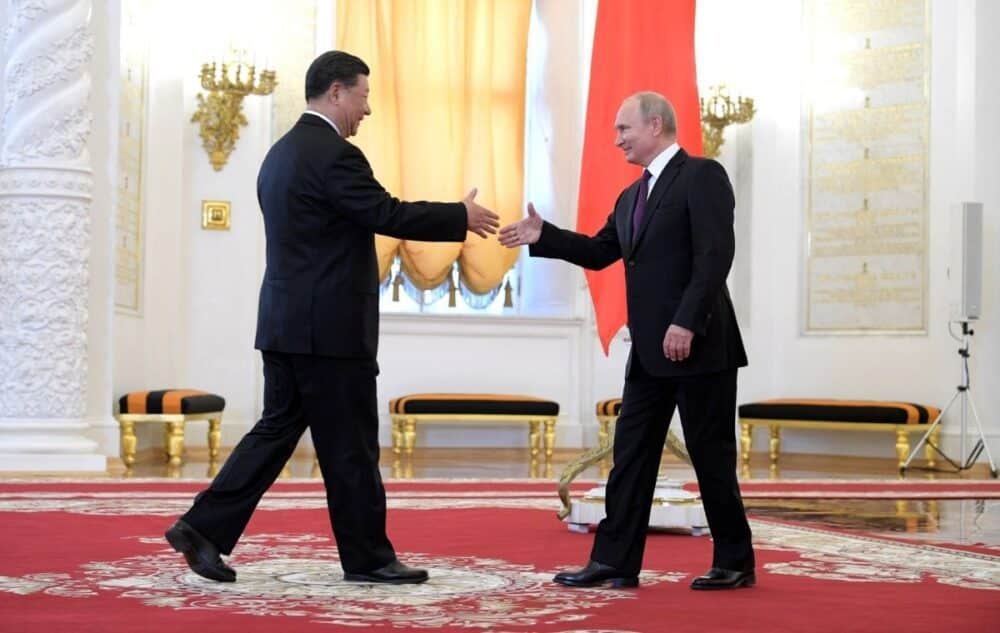
Russian Foreign Minister Sergey Lavrov paid his first visit to crucial partner China since his country’s invasion of Ukraine on Wednesday, advancing a vision of new world order.
Early Wednesday, Moscow’s top diplomat arrived in Huangshan, China, for a series of consultations concerning Afghanistan’s future, but Russia’s violent assault on its neighbor was sure to shadow big over the proceedings.
Beijing has refused to criticize the incursion and has provided diplomatic cover for a Russia that is becoming increasingly isolated.
Officials in the United States have accused China of indicating a “willingness” to provide military and economic assistance to Russia, while Vice President Joe Biden has compared the invasion of Ukraine to China’s 1989 suppression of protestors in Tiananmen Square.
Duterte aspires to a “new international order” dominated by China and Russia
Lavrov, on the other hand, sketched a picture of a new “world order” on Wednesday, saying the globe was “living through a very serious stage in the history of international relations.”
“We will advance towards a multipolar, just, democratic international order with you and our sympathizers,” Lavrov said in a video posted by the Russian foreign ministry ahead of a meeting with Chinese Foreign Minister Wang Yi.
On Chinese official television, the two ministers were seen wearing face masks and shaking elbows in front of their respective country flags.
“China-Russia ties have withstood the new test of the changing world circumstances, maintained the correct path of progress, and demonstrated tenacious development momentum,” Wang Yi said in a statement released by the Chinese foreign ministry.
Wang Wenbin, a spokeswoman for the Chinese Foreign Ministry, told reporters earlier that Moscow and Beijing would keep working together to “promote global multipolarity and the democratization of international relations.”
China’s goals and their implications for the United States
“China-Russia collaboration has no bounds,” Wang continued, echoing a phrase used by President Vladimir Putin and his Chinese colleague Xi Jinping to describe the relationship.
“Our pursuit of peace knows no bounds, our defense of security knows no bounds, and our opposition to hegemony knows no bounds,” Wang added.
What impact does the Ukraine conflict have on China’s attitude toward Taiwan?
Lavrov will join a series of talks organized by China to discuss measures to help Afghanistan, which will also include officials from the US and the country’s neighbors.
Although China and Afghanistan share only a sliver of a border, Beijing has long feared that its neighbor may become a staging ground for Muslim Uyghur insurgents from Xinjiang. The conversations come after Wang’s journey to Kabul last week, which was his first since the Taliban took power in Afghanistan.
In recent years, China and Russia have grown closer, with Putin attending the opening ceremony of the Beijing Winter Olympics only days before the invasion of Ukraine. During Putin’s visit, the strongman leader and China’s Xi sealed billion-dollar energy deals.
Before the opening ceremony in Beijing, Putin met privately with Xi, and the two presidents issued a joint statement later that showed a united front in the face of Western criticism. The statement, which was posted on the Kremlin’s website, aimed to depict Russia and China as purveyors of democracy and freedom on the international stage, rather than rivals.
Even without specifically identifying any opponents, the message was clear: the world is changing, and China and Russia will not be kept back.
“Some forces representing a minority on the world stage continue to advocate unilateral approaches to solving international problems and resort to power politics, practice interference in the internal affairs of other states, causing contradictions, disagreements, and confrontation,” the February statement said.
“Democracy isn’t founded on stencils,” they declared. People in a given state have the right to choose forms and ways of implementing democracy that correspond to the state’s socio-political structure, history, traditions, and cultural traits. Only the people of a country have the authority to choose whether or not it is democratic.”
At first glance, the message may appear to be easy to dismiss in the democratic West: Russian and Chinese citizens do not “have the right to choose such forms and methods of implementing democracy” as they wish, because neither country holds free and fair elections, and speaking out against existing “forms and methods” of governance often results in imprisonment for those who do so.
China and Russia reaffirmed “their firm mutual support in preserving their fundamental interests, state sovereignty, and territorial integrity, and oppose the intervention of external forces in their domestic affairs” in a joint declaration issued early this year.